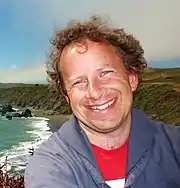Jeremy Howard (entrepreneur)
Jeremy Howard (born 13 November 1973) is an Australian data scientist and entrepreneur.[3] He began his career in management consulting, at McKinsey & Company and AT Kearney. Howard went on to co-found FastMail in 1999 and Optimal Decisions Group. He later joined Kaggle, an online community for data scientists, as President and Chief Scientist.
Jeremy Howard | |
|---|---|
 Howard in Maui, 2014 | |
| Born | 13 November 1973 London, England |
| Nationality | Australian |
| Alma mater | University of Melbourne |
| Occupation | Entrepreneur |
| Known for | Work in Deep Learning, Machine Learning |
| Awards | Winner of global Kaggle Data Science Competitions, 2011 and 2010[1][2] |
| Website | http://jhoward.fastmail.fm.user.fm/ |
Together with Rachel Thomas, he is the co-founder of fast.ai, a research institute dedicated to make Deep Learning more accessible. Previously, he was the CEO and Founder at Enlitic, an advanced machine learning company in San Francisco, California.
Howard teaches data science at company Singularity University. He is also a Young Global Leader with the World Economic Forum, and spoke at the World Economic Forum Annual Meeting 2014 on "Jobs For The Machines."[4] Howard advised Khosla Ventures as their Data Strategist, identifying the biggest opportunities for investing in data-driven startups and mentoring their portfolio companies to build data-driven businesses.
Early life and background
Howard was born in London, United Kingdom, and moved to Melbourne, Australia in 1976. He attended Melbourne Grammar and studied philosophy at the University of Melbourne.
Career
Howard started his career in management consulting, working McKinsey & Co and AT Kearney.[5] He remained in management consulting for eight years before becoming an entrepreneur.
Early in his career, Howard contributed to open source projects, particularly the Perl programming language, Cyrus IMAP server, and Postfix SMTP server. He helped develop the Perl language, as chair of the Perl6-data working group, and author of RFCs.
While in Australia, Howard founded two successful startups: the email provider FastMail.FM, which he sold to Opera Software, and the insurance pricing optimization company Optimal Decisions Group (ODG), which he sold to ChoicePoint.[6] FastMail was one of the first email products that enabled users to integrate their familiar desktop clients.
Kaggle
Howard first became involved with Kaggle, founded in April 2010,[7] after becoming the globally top-ranked participant in data science competitions in both 2010 and 2011. The competitions that Howard won involved tourism forecasting[1] and predicting the success of grant applications.[2] Howard then became the President and Chief Scientist of Kaggle.[8]
In December 2011, Wired Magazine ran a piece on Howard, calling him 'The Accidental Scientist'.[9] Howard was also interviewed by the McKinsey Quarterly, where he explained that the rapid advance of machine learning presents an economic paradox; while productivity is rising, employment may not.[10] By December 2013, Howard had left his position as President of Kaggle.[11]
Enlitic
In August 2014, Howard founded Enlitic to use machine learning to make medical diagnostics and clinical decision support tools faster, more accurate, and more accessible. Enlitic uses Deep Learning algorithms to diagnose illness and disease.[12] Howard believes that today, machine learning algorithms are actually as good as or better than humans at many things that we think of as being uniquely human capabilities.[13]
Personal life and interests
Howard used Spaced Repetitive Learning to develop usable Chinese language skills in just one year.[14] He has mentored and advised many startups, and is also an angel investor. He has contributed to a range of open-source projects as a developer, and was a regular guest expert on Australia's most popular TV morning news program Sunrise.
In 2020, Jeremy Howard shared his experiences about learning, teaching, developing, and making deep learning more accessible on Gradient Dissent podcast.
References
- "Kaggle leaderboard for Tourism Forecasting Part One".
- "Kaggle leaderboard for Predicting Grant Applications".
- "Opera acquires Aussie IMAP email provider FastMail.fm".
- "Jobs for The Machines".
- Brooks, Melissa (15 December 2017). "Jeremy Howard". University of San Francisco. Retrieved 25 October 2020.
- McCaul, Fiona (5 February 2008). "ChoicePoint acquires Optimal Decisions Group (ODG) to Enhance Insurance Analytics Capabilities". ThomasNet.
- Rao, Leena (2 November 2011). "Index And Khosla Lead $11M Round In Kaggle, A Platform For Data Modeling Competitions". TechCrunch. Retrieved 13 December 2011.
- "Kaggle - Our Team".
- Metz, Cade (13 December 2011). "Accidental Scientist Hawks 'Online Marketplace for Brains'". Wired.
- "McKinsey Quarterly - The Great Decoupling".
- "Quora - Why did Jeremy Howard leave Kaggle? What are his plans now?".
- "McKinsey Quarterly - Artificial intelligence meets the C-suite".
- Finley, Klint (22 August 2014). "The Data Scientist on a Quest to Turn Computers Into Doctors". Wired. Retrieved 4 October 2018.
- "Jeremy Howard on Language Acquisition Performance".